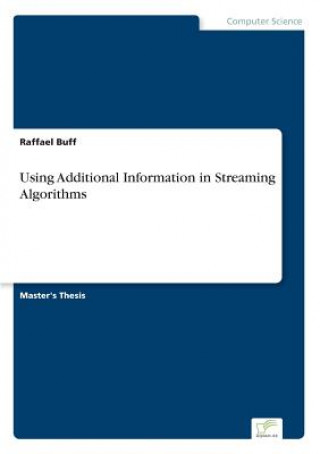
Kod: 15223817
Using Additional Information in Streaming Algorithms
Autor Raffael Buff
Streaming problems are algorithmic problems that are mainly characterized by their massive input streams. Because of these data streams, the algorithms for these problems are forced to be space-efficient, as the input stream lengt ... więcej
- Język:
 Angielski
Angielski - Oprawa: Miękka
- Liczba stron: 132
Wydawca: Diplom.de, 2016
- Więcej informacji o książce

Zobacz książki o podobnej tematyce
-

A Brief History Of Time
56.04 zł -12 % -
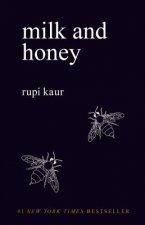
Milk and Honey
61.42 zł -13 % -

Basic Chord Progressions
37.05 zł -
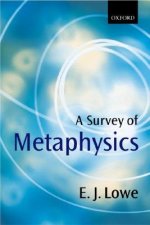
Survey of Metaphysics
611.87 zł -

Dirt Track Chassis & Suspension
138.39 zł -11 % -
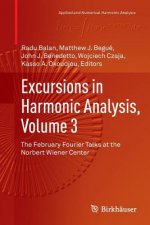
Excursions in Harmonic Analysis, Volume 3
290.90 zł -
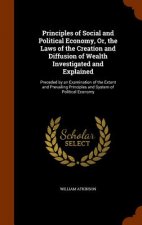
Principles of Social and Political Economy, Or, the Laws of the Creation and Diffusion of Wealth Investigated and Explained
213.33 zł
Bon podarunkowy: Radość gwarantowana
- Podaruj bon o dowolnej wartości, a my się zajmiemy resztą.
- Bon podarunkowy dotyczy całej naszej oferty.
- Możesz wydrukować elektroniczny bon z e-maila a następnie przekazać go obdarowanemu.
- Ważność bonu wynosi 12 miesięcy od daty wystawienia.
Więcej informacji o Using Additional Information in Streaming Algorithms
Za ten zakup dostaniesz 287 punkty
 Opis
Opis
Streaming problems are algorithmic problems that are mainly characterized by their massive input streams. Because of these data streams, the algorithms for these problems are forced to be space-efficient, as the input stream length generally exceeds the available storage. In this thesis, the two streaming problems most frequent item and number of distinct items are studied in detail relating to their algorithmic complexities, and it is compared whether the verification of solution hypotheses has lower algorithmic complexity than computing a solution from the data stream. For this analysis, we introduce some concepts to prove space complexity lower bounds for an approximative setting and for hypothesis verification. For the most frequent item problem which consists in identifying the item which has the highest occurrence within the data stream, we can prove a linear space complexity lower bound for the deterministic and probabilistic setting. This implies that, in practice, this streaming problem cannot be solved in a satisfactory way since every algorithm has to exceed any reasonable storage limit. For some settings, the upper and lower bounds are almost tight, which implies that we have designed an almost optimal algorithm. Even for small approximation ratios, we can prove a linear lower bound, but not for larger ones. Nevertheless, we are not able to design an algorithm that solves the most frequent item problem space-efficiently for large approximation ratios. Furthermore, if we want to verify whether a hypothesis of the highest frequency count is true or not, we get exactly the same space complexity lower bounds, which leads to the conclusion that we are likely not able to profit from a stated hypothesis. The number of distinct items problem counts all different elements of the input stream. If we want to solve this problem exactly (in a deterministic or probabilistic setting) or approximately with a deterministic algorithm, we require once again linear storage size which is tight to the upper bound. However, for the approximative and probabilistic setting, we can enhance an already known space-efficient algorithm such that it is usable for arbitrarily small approximation ratios and arbitrarily good success probabilities. The hypothesis verification leads once again to the same lower bounds. However, there are some streaming problems that are able to profit from additional information such as hypotheses, as e.g., the median problem.
 Szczegóły książki
Szczegóły książki
Kategoria Książki po angielsku Computing & information technology Computer programming / software development Programming & scripting languages: general
495.91 zł
- Pełny tytuł: Using Additional Information in Streaming Algorithms
- Autor: Raffael Buff
- Język:
 Angielski
Angielski - Oprawa: Miękka
- Liczba stron: 132
- EAN: 9783961165421
- ISBN: 3961165424
- ID: 15223817
- Wydawca: Diplom.de
- Waga: 181 g
- Wymiary: 210 × 148 × 8 mm
- Data wydania: 05. October 2016
Ulubione w innej kategorii
-
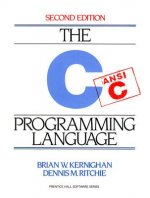
C Programming Language
199.72 zł -5 % -
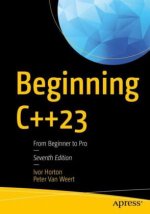
Beginning C++23
262.17 zł -6 % -

Practical Object-Oriented Design
182.76 zł -
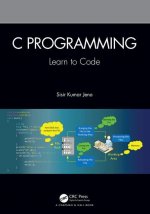
C Programming
750.17 zł -
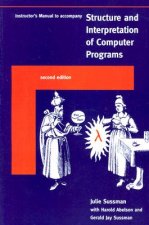
Instructor's Manual t/a Structure and Interpretation of Computer Programs
202.26 zł -
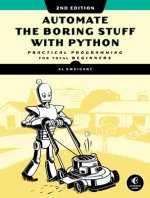
Automate The Boring Stuff With Python, 2nd Edition
153.52 zł -13 % -

C++ Concurrency in Action,2E
322.38 zł -4 % -
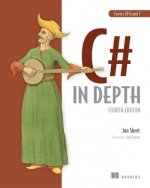
C# in Depth, 4E
250.69 zł -
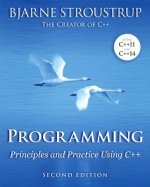
Programming
290.50 zł -4 % -
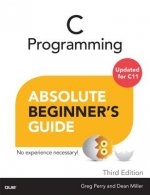
C Programming Absolute Beginner's Guide
126.61 zł -5 % -
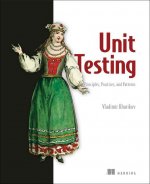
Unit Testing:Principles, Practices and Patterns
230.79 zł -5 % -
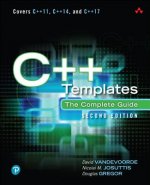
C++ Templates
373.25 zł -
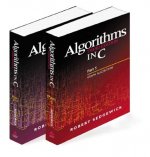
Algorithms in C, Parts 1-5
619.79 zł -
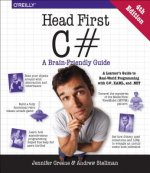
Head First C#, 4e
270.59 zł -10 % -
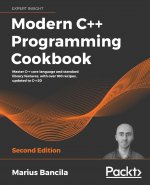
Modern C++ Programming Cookbook
250.89 zł -
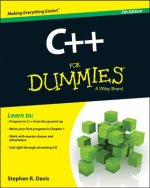
C++ For Dummies, 7e
111.07 zł -30 % -
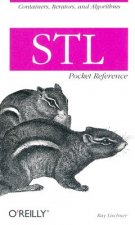
STL Pocket Reference
43.75 zł -10 % -
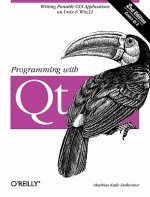
Programming with QT 2e
227.54 zł -
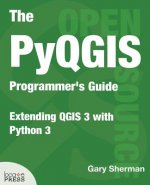
Pyqgis Programmer's Guide
275.47 zł -

Programming PIC Microcontrollers with XC8
262.98 zł -6 % -
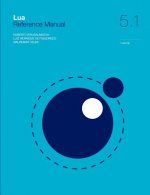
Lua 5.1 Reference Manual
86.30 zł -5 % -
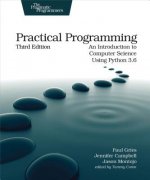
Practical Programming, 3e
265.11 zł -

JavaScript & JQuery - Interactive Front-End Web Development
139.61 zł -38 % -

Pro Spring 6 with Kotlin
243.28 zł -7 % -
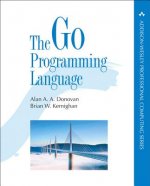
Go Programming Language, The
148.44 zł -5 % -

Official Scratch Coding Cards, The (scratch 3.0)
81.83 zł -10 % -
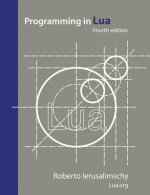
Programming in Lua, fourth edition
190.99 zł -3 % -
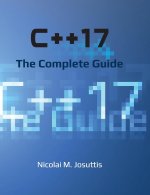
C++17 - The Complete Guide
298.62 zł -

Complete Guide to Test Automation
243.28 zł -7 % -

Effective C++
199.72 zł -5 % -
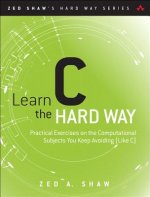
Learn C the Hard Way
144.18 zł -4 % -

Fanuc CNC Custom Macros
403.31 zł -
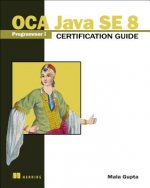
OCA Java SE 8 Programmer I Certification Guide
276.69 zł -4 % -
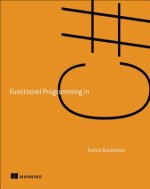
Functional Programming in C#
265.21 zł -

Clean C++20
184.08 zł -7 % -
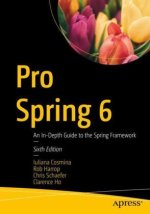
Pro Spring 6
242.57 zł -6 % -
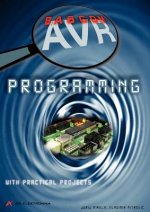
Bascom-AVR Programming
117.98 zł -
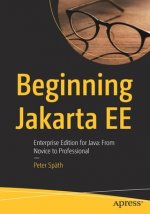
Beginning Jakarta EE
223.58 zł -6 % -
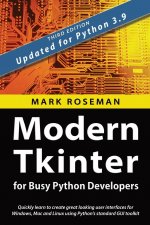
Modern Tkinter for Busy Python Developers
166.82 zł -5 % -
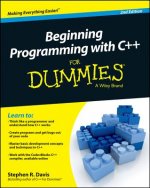
Beginning Programming with C++ For Dummies, 2e
146.72 zł -5 % -
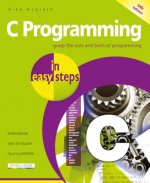
C Programming in easy steps
66.60 zł -11 % -
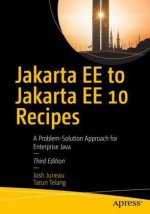
Java EE to Jakarta EE 10 Recipes
262.98 zł -6 % -
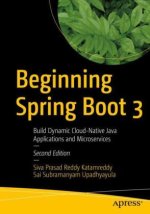
Beginning Spring Boot 3
243.28 zł -7 % -

Coding for Kids C++
64.71 zł -

Practical Rust Projects
271 zł -10 % -
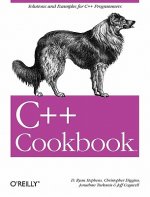
C++ Cookbook
195.15 zł -10 % -
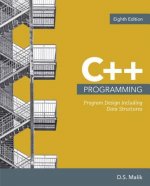
C++ Programming
1392.41 zł -
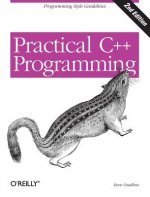
Practical C++ Programming 2e
207.13 zł -4 % -
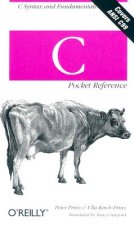
C Pocket Reference
100.51 zł -11 %
zadowolonych klientów
Od roku 2008 obsłużyliśmy wielu miłośników książek, ale dla nas każdy był tym wyjątkowym.
Copyright! ©2008-24 libristo.pl Wszelkie prawa zastrzeżonePrywatnieCookies



 21 milionów książek
21 milionów książek Dostawa 10.99 zł
Dostawa 10.99 zł (32) 444 93 66 (8-15.30h)
(32) 444 93 66 (8-15.30h)